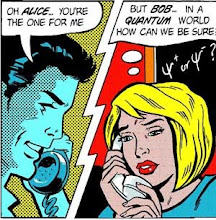Graviton (the force carrier of Gravity):
The graviton is a hypothetical elementary particle that mediates the force of gravitation in the framework of quantum... field theory. If it exists, the graviton is expected to be massless (because the gravitational force appears to have unlimited range) and must be a spin-2 boson.
The three other known forces of nature are mediated by elementary particles: electromagnetism by the photon, the strong interaction by the gluons, and the weak interaction by the W and Z bosons. The hypothesis is that the gravitational interaction is likewise mediated by a – yet undiscovered – elementary particle, dubbed the graviton. In the classical limit, the theory would reduce to general relativity and conform to Newton's law of gravitation in the weak-field limit.
Unlike the force carriers of the other forces, gravitation plays a special role in general relativity in defining the spacetime in which events take place. Because the diffeomorphism invariance of the theory does not allow any particular space-time background to be singled out as the "true" space-time background, general relativity is said to be background independent. In contrast, the Standard Model is not background independent, with Minkowski space enjoying a special status as the fixed background space-time. A theory of quantum gravity is needed in order to reconcile these differences. Whether this theory should be background independent is an open question. The answer to this question will determine our understanding of what specific role gravitation plays in the fate of the universe.
String theory predicts the existence of gravitons and their well-defined interactions. Unambiguous detection of individual gravitons, though not prohibited by any fundamental law, is impossible with any physically reasonable detector. The reason is the extremely low cross section for the interaction of gravitons with matter. For example, a detector with the mass of Jupiter and 100% efficiency, placed in close orbit around a neutron star, would only be expected to observe one graviton every 10 years, even under the most favorable conditions. It would be impossible to discriminate these events from the background of neutrinos, since the dimensions of the required neutrino shield would ensure collapse into a black hole.
[IMAGE: Elementary Particles.]
Source: http://en.wikipedia.org/wiki/
The graviton is a hypothetical elementary particle that mediates the force of gravitation in the framework of quantum... field theory. If it exists, the graviton is expected to be massless (because the gravitational force appears to have unlimited range) and must be a spin-2 boson.
The three other known forces of nature are mediated by elementary particles: electromagnetism by the photon, the strong interaction by the gluons, and the weak interaction by the W and Z bosons. The hypothesis is that the gravitational interaction is likewise mediated by a – yet undiscovered – elementary particle, dubbed the graviton. In the classical limit, the theory would reduce to general relativity and conform to Newton's law of gravitation in the weak-field limit.
Unlike the force carriers of the other forces, gravitation plays a special role in general relativity in defining the spacetime in which events take place. Because the diffeomorphism invariance of the theory does not allow any particular space-time background to be singled out as the "true" space-time background, general relativity is said to be background independent. In contrast, the Standard Model is not background independent, with Minkowski space enjoying a special status as the fixed background space-time. A theory of quantum gravity is needed in order to reconcile these differences. Whether this theory should be background independent is an open question. The answer to this question will determine our understanding of what specific role gravitation plays in the fate of the universe.
String theory predicts the existence of gravitons and their well-defined interactions. Unambiguous detection of individual gravitons, though not prohibited by any fundamental law, is impossible with any physically reasonable detector. The reason is the extremely low cross section for the interaction of gravitons with matter. For example, a detector with the mass of Jupiter and 100% efficiency, placed in close orbit around a neutron star, would only be expected to observe one graviton every 10 years, even under the most favorable conditions. It would be impossible to discriminate these events from the background of neutrinos, since the dimensions of the required neutrino shield would ensure collapse into a black hole.
[IMAGE: Elementary Particles.]
Source: http://en.wikipedia.org/wiki/







No comments:
Post a Comment